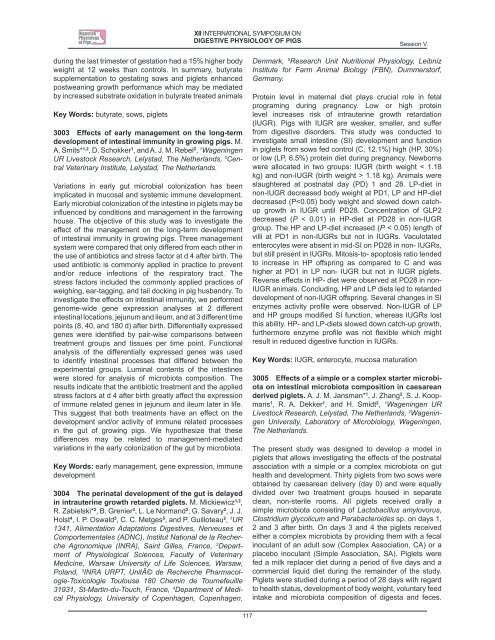XII - 12th International Symposium - Digestive Physiology of Pigs
XII - 12th International Symposium - Digestive Physiology of Pigs
XII - 12th International Symposium - Digestive Physiology of Pigs
You also want an ePaper? Increase the reach of your titles
YUMPU automatically turns print PDFs into web optimized ePapers that Google loves.
<strong>Digestive</strong><br />
<strong>Physiology</strong><br />
<strong>of</strong> <strong>Pigs</strong><br />
during the last trimester <strong>of</strong> gestation had a 15% higher body<br />
weight at 12 weeks than controls. In summary, butyrate<br />
supplementation to gestating sows and piglets enhanced<br />
postweaning growth performance which may be mediated<br />
by increased substrate oxidation in butyrate treated animals<br />
Key words: butyrate, sows, piglets<br />
3003 effects <strong>of</strong> early management on the long-term<br />
development <strong>of</strong> intestinal immunity in growing pigs. M.<br />
A. Smits* 1,2 , D. Schokker 1 , and A. J. M. Rebel 2 , 1 Wageningen<br />
UR Livestock Research, Lelystad, The Netherlands, 2 Central<br />
Veterinary Institute, Lelystad, The Netherlands.<br />
Variations in early gut microbial colonization has been<br />
implicated in mucosal and systemic immune development.<br />
Early microbial colonization <strong>of</strong> the intestine in piglets may be<br />
influenced by conditions and management in the farrowing<br />
house. The objective <strong>of</strong> this study was to investigate the<br />
effect <strong>of</strong> the management on the long-term development<br />
<strong>of</strong> intestinal immunity in growing pigs. Three management<br />
system were compared that only differed from each other in<br />
the use <strong>of</strong> antibiotics and stress factor at d 4 after birth. The<br />
used antibiotic is commonly applied in practice to prevent<br />
and/or reduce infections <strong>of</strong> the respiratory tract. The<br />
stress factors included the commonly applied practices <strong>of</strong><br />
weighing, ear-tagging, and tail docking in pig husbandry. To<br />
investigate the effects on intestinal immunity, we performed<br />
genome-wide gene expression analyses at 2 different<br />
intestinal locations, jejunum and ileum, and at 3 different time<br />
points (8, 40, and 180 d) after birth. Differentially expressed<br />
genes were identified by pair-wise comparisons between<br />
treatment groups and tissues per time point. Functional<br />
analysis <strong>of</strong> the differentially expressed genes was used<br />
to identify intestinal processes that differed between the<br />
experimental groups. Luminal contents <strong>of</strong> the intestines<br />
were stored for analysis <strong>of</strong> microbiota composition. The<br />
results indicate that the antibiotic treatment and the applied<br />
stress factors at d 4 after birth greatly affect the expression<br />
<strong>of</strong> immune related genes in jejunum and ileum later in life.<br />
This suggest that both treatments have an effect on the<br />
development and/or activity <strong>of</strong> immune related processes<br />
in the gut <strong>of</strong> growing pigs. We hypothesize that these<br />
differences may be related to management-mediated<br />
variations in the early colonization <strong>of</strong> the gut by microbiota.<br />
Key words: early management, gene expression, immune<br />
development<br />
3004 The perinatal development <strong>of</strong> the gut is delayed<br />
in intrauterine growth retarded piglets. M. Mickiewicz 1,2 ,<br />
R. Zabielski* 2 , B. Grenier 3 , L. Le Normand 2 , G. Savary 2 , J. J.<br />
Holst 4 , I. P. Oswald 3 , C. C. Metges 5 , and P. Guilloteau 2 , 1 UR<br />
1341, Alimentation Adaptations <strong>Digestive</strong>s, Nerveuses et<br />
Comportementales (ADNC), Institut National de la Recherche<br />
Agronomique (INRA), Saint Gilles, France, 2 Department<br />
<strong>of</strong> Physiological Sciences, Faculty <strong>of</strong> Veterinary<br />
Medicine, Warsaw University <strong>of</strong> Life Sciences, Warsaw,<br />
Poland, 3 INRA URPT, Unité de Recherche Pharmacologie-Toxicologie<br />
Toulouse 180 Chemin de Tournefeuille<br />
31931, St-Martin-du-Touch, France, 4 Department <strong>of</strong> Medical<br />
<strong>Physiology</strong>, University <strong>of</strong> Copenhagen, Copenhagen,<br />
<strong>XII</strong> INTERNATIONAL SYMPOSIUM ON<br />
DIGESTIVE PHYSIOLOGY OF PIGS<br />
117<br />
Session V<br />
Denmark, 5 Research Unit Nutritional <strong>Physiology</strong>, Leibniz<br />
Institute for Farm Animal Biology (FBN), Dummerstorf,<br />
Germany.<br />
Protein level in maternal diet plays crucial role in fetal<br />
programing during pregnancy. Low or high protein<br />
level increases risk <strong>of</strong> intrauterine growth retardation<br />
(IUGR). <strong>Pigs</strong> with IUGR are weaker, smaller, and suffer<br />
from digestive disorders. This study was conducted to<br />
investigate small intestine (SI) development and function<br />
in piglets from sows fed control (C, 12.1%) high (HP, 30%)<br />
or low (LP, 6.5%) protein diet during pregnancy. Newborns<br />
were allocated in two groups: IUGR (birth weight < 1.18<br />
kg) and non-IUGR (birth weight > 1.18 kg). Animals were<br />
slaughtered at postnatal day (PD) 1 and 28. LP-diet in<br />
non-IUGR decreased body weight at PD1, LP and HP-diet<br />
decreased (P


